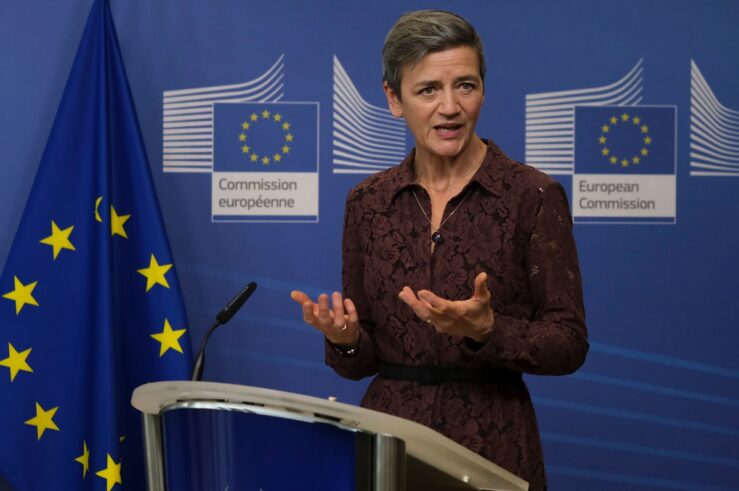Showing results for: “digital markets act”
Untangling the 9th Circuit’s Ruling in Epic Games v Apple
The 9th U.S. Circuit Court of Appeals ruled late last month on Epic Games’ appeal of the decision rendered in 2021 by the U.S. District Court for the Northern District of California in Epic Games v Apple, affirming in part and reversing in part the district court’s judgment. In the original case, Epic had challenged as a violation ... Untangling the 9th Circuit’s Ruling in Epic Games v Apple
The destiny of telecom regulation is antitrust
This week the FCC will vote on Chairman Ajit Pai’s Restoring Internet Freedom Order. Once implemented, the Order will rescind the 2015 Open Internet Order and return antitrust and consumer protection enforcement to primacy in Internet access regulation in the U.S. In anticipation of that, earlier this week the FCC and FTC entered into a ... The destiny of telecom regulation is antitrust
Does the DMA Let Gatekeepers Protect Data Privacy and Security?
It’s been an eventful two weeks for those following the story of the European Union’s implementation of the Digital Markets Act. On April 18, the European Commission began a series of workshops with the companies designated as “gatekeepers” under the DMA: Apple, Meta, Alphabet, Amazon, ByteDance, and Microsoft. And even as those workshops were still ... Does the DMA Let Gatekeepers Protect Data Privacy and Security?
How the FTC’s Amazon Case Gerrymanders Relevant Markets and Obscures Competitive Processes
As Greg Werden has noted, the process of defining the relevant market in an antitrust case doesn’t just finger which part of the economy is allegedly affected by the challenged conduct, but it also “identifies the competitive process alleged to be harmed.” Unsurprisingly, plaintiffs in such proceedings (most commonly, antitrust enforcers) often seek to set ... How the FTC’s Amazon Case Gerrymanders Relevant Markets and Obscures Competitive Processes
James Cooper on the Limits of Section 5’s Scope Beyond the Sherman Act
The FTC has long been on a quest to find the elusive species of conduct that Section 5 alone can tackle. A series of early Supreme Court cases interpreting the FTC Act – the most recent and widely cited of which is more than forty years old (FTC v. Sperry & Hutchinson Co., 405 U.S. ... James Cooper on the Limits of Section 5’s Scope Beyond the Sherman Act
What’s An Internet Monopolist? A Reply to Professor Wu
We’ve been reading with interest a bit of an blog squabble between Tim Wu and Adam Thierer ( see here and here) set off by Professor Wu’s WSJ column: “In the Grip of the New Monopolists.” Wu’s column makes some remarkable claims, and, like Adam, we find it extremely troubling. Wu starts off with some ... What’s An Internet Monopolist? A Reply to Professor Wu
Political Philosophy, Competition, and Competition Law: The Road to and from Neoliberalism, Part 3
As it has before in its history, liberalism again finds itself at an existential crossroads, with liberally oriented reformers generally falling into two camps: those who seek to subordinate markets to some higher vision of the common good and those for whom the market itself is the common good. The former seek to rein in, ... Political Philosophy, Competition, and Competition Law: The Road to and from Neoliberalism, Part 3
Note to the FTC: Punishing Efficiency Means Destroying Competition
Yesterday, Lina Khan’s FTC released their long-awaited draft merger guidelines for public comment. Regrettably yet not unsurprisingly, the new guidelines are a radical departure from established case law and antitrust thinking. They’re marked by a failure to account for the role of efficiencies in the competitive process, and a failure to distinguish between the implications of generally ... Note to the FTC: Punishing Efficiency Means Destroying Competition
FTC Commissioner Joshua Wright gets his competiton enforcement guidelines
Today, for the first time in its 100-year history, the FTC issued enforcement guidelines for cases brought by the agency under the Unfair Methods of Competition (“UMC”) provisions of Section 5 of the FTC Act. The Statement of Enforcement Principles represents a significant victory for Commissioner Joshua Wright, who has been a tireless advocate for ... FTC Commissioner Joshua Wright gets his competiton enforcement guidelines
Goodbye Margrethe, Hello Didier: What Next for European Competition Law?
European Commissioner for Competition Margrethe Vestager announced Sept. 5 that she was leaving her position after nearly a decade in charge, which for the last four years has also included holding the title of “executive vice president of the European Commission for a Europe fit for the Digital Age.” Her departure caps off an uncharacteristically ... Goodbye Margrethe, Hello Didier: What Next for European Competition Law?
Buck’s “Third Way”: A Different Road to the Same Destination
Congressman Buck’s “Third Way” report offers a compromise between the House Judiciary Committee’s majority report, which proposes sweeping new regulation of tech companies, and the status quo, which Buck argues is unfair and insufficient. But though Buck rejects many of the majority’s reports proposals, what he proposes instead would lead to virtually the same outcome ... Buck’s “Third Way”: A Different Road to the Same Destination
Four Problems with the Supreme Court’s Refusal To Hear the Epic v Apple Dispute
The U.S. Supreme Court this week rejected both parties’ petitions for certiorari in appeals of the 9th U.S. Circuit Court of Appeals’ Epic Games v Apple decision. Many observers—including Epic CEO Tim Sweeney—have marked this as an unmitigated loss for Epic. That’s partly right. The district court had correctly rejected Epic’s federal antitrust claims against ... Four Problems with the Supreme Court’s Refusal To Hear the Epic v Apple Dispute










